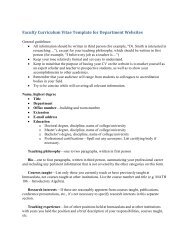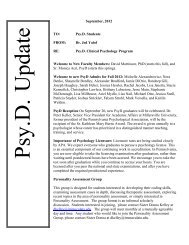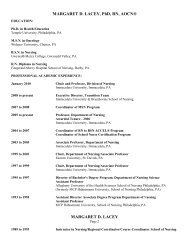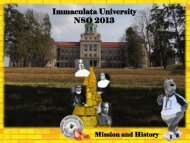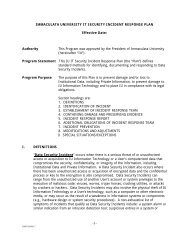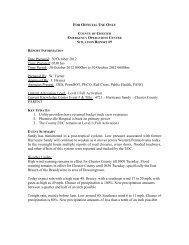Undergraduate Catalog 2008-2010 - Immaculata University
Undergraduate Catalog 2008-2010 - Immaculata University
Undergraduate Catalog 2008-2010 - Immaculata University
You also want an ePaper? Increase the reach of your titles
YUMPU automatically turns print PDFs into web optimized ePapers that Google loves.
INFORMATION TECHNOLOGY IN BUSINESS (BA)<br />
(Offered only through ACCEL ® Programs)<br />
REQUIREMENTS FOR DEGREE COMPLETION<br />
• Liberal Arts: English (6); world civilization (3); foreign<br />
language (3)*; philosophy (6); theology (3)*; designated<br />
humanities (6)*; social science (9)*; laboratory science (3),<br />
mathematics (3)*.<br />
*Three credits each of foreign language, humanities, social science,<br />
and mathematics may be met through successful completion of<br />
modules within ACCEL ®<br />
• Major: CIS 213, 221, 223, 225, 309, 310, 311, 312, 335;<br />
MATH 103; ORG 307, 342, 344, 345, 383; CCS 341; COM<br />
240; THE 381<br />
• Electives as needed to complete a total of 126 credits.<br />
CIS 213 Organization Design and Support (3)<br />
A study of information technology organizational design and<br />
support structures essential to efficient operation and excellent<br />
client service. Learners examine common methods and<br />
organizational designs for managing information and support<br />
services. Attention is given to the technical, interpersonal, and<br />
social issues in user support and the technical aspects of<br />
troubleshooting problems. (Offered in accelerated format only.)<br />
CIS 221 Concepts of Systems Thinking (1)<br />
Introduction to the logical structure and development of programs<br />
and applications. Emphasis is on fundamental logic, flowcharting,<br />
analysis, and revision. (Offered in accelerated format only.)<br />
CIS 223 Systems Analysis and Design (3)<br />
An introduction to the systems development life cycle and the<br />
strategies and techniques of structured system development.<br />
Learners discuss and explore a variety of design and CASE tools.<br />
(Offered in accelerated format only.)<br />
CIS 225 Database Management Systems (3)<br />
The course provides the fundamental concepts necessary to<br />
design and implement relational database applications. This course<br />
focuses on data modeling and Structure Query Language (SQL).<br />
(Offered in accelerated format only.)<br />
CIS 309 Managing Issues in IT Projects (3)<br />
An introduction to the issues concerning IT projects. This<br />
module examines the causes of the difficulties from cultural,<br />
organizational, and technical perspectives. It also discusses<br />
strategies for overcoming project difficulties. Learners are<br />
challenged to evaluate the current practices and consider alternative<br />
project strategies. (Offered in accelerated format only.)<br />
CIS 310 Basics of HCI ( 2)<br />
An introduction to Human Computer Interaction techniques used<br />
to design useful and usable software systems. The course integrates<br />
theory with best practices. It integrates the knowledge and skills<br />
required to engineer and/or evaluate the usefulness and usability of<br />
a software application’s user interface. (Prerequisite: CIS 223:<br />
Systems Analysis and Design OR CIS 325: Systems Analysis and<br />
Design). (Offered in accelerated format only.)<br />
CIS 311 E-Commerce Introduction (1)<br />
An executive overview of e-commerce. This course introduces<br />
students to e-commerce in terms of the business and information<br />
technology concepts. Learners explore the essential elements and<br />
usefulness of e-commerce. (Offered in accelerated format only.)<br />
CIS 312 Topics in Software Development (3)<br />
An examination of emerging topics in software development.<br />
This course explores emerging software development<br />
methodologies and strategies that can potentially improve software<br />
development project success rates. It will draw on the student’s<br />
knowledge of issues in IT projects as well as an understanding of<br />
current software development methodologies and strategies.<br />
(Offered in accelerated format only.)<br />
CIS 335 Technology and Ethical Issues (3)<br />
Issues driven by technology and information: validity,<br />
timeliness, freedom, limitations, privacy, access, intellectual<br />
property, copyright, intellectual integrity; communication law.<br />
(Competency in CIS 201 content is recommended.) (Traditional and<br />
accelerated formats)<br />
MATH 103 Mathematics and Information Technology (3)<br />
Overview of mathematical topics essential to information<br />
technology. Learners will hone critical thinking skills and problem<br />
solving strategies while exploring elements of set theory,<br />
mathematical logic, probability and statistics, graph theory, and<br />
fundamental algebra. (Offered in accelerated format only.)<br />
ORG 307 Adult Development and Life Assessment (3)<br />
Introduction to adult development theory, linking concepts to life<br />
experiences through a process of individual reflection. Classical and<br />
contemporary adult development theories are examined to provide<br />
paradigms for self-analysis and life assessment.<br />
ORG 342 Managerial Economics (3)<br />
A focus on the principles of economics as needed to be<br />
understood and utilized by managers and supervisors in all fields.<br />
In an era of “downsizing” or “rightsizing” resulting from<br />
international competition and globalization, managers at every level<br />
must understand and be able to use the principles of economics in<br />
making sound decisions.<br />
ORG 344 Accounting and Finance for Managers (4)<br />
This course explores fields of accounting and finance critical to<br />
every business situation. Many of the topics are interrelated, but<br />
some are studied in isolation. The focus of the course is on<br />
understanding accounting and finance principles as reflected in<br />
financial statements, their relationship to each other, and how data<br />
in financial statements are used in evaluation, planning, and control<br />
in an organization.<br />
ORG 345 Issues in Management (3)<br />
An examination of motivational theory and its application to<br />
individual and group functioning in work and home situations.<br />
Leadership styles related to particular circumstances are analyzed.<br />
Negotiation and analysis of productivity are included. General<br />
issues of managing change in organizations are also considered.<br />
ORG 383 Strategic Planning (3)<br />
Students are introduced to various management planning models<br />
and techniques and apply them to business cases. Strategic<br />
planning and management concepts are stressed.<br />
CCS 341 Cultural Modes of Expression in the Global<br />
Community (3)<br />
An exploration of the nuances of intercultural expression for an<br />
awareness and sensitivity needed for mutual understanding in<br />
international affairs.<br />
83




